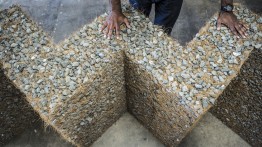Self-Assembly Lab, MIT: Experiments in Programming Matter
Fri, Nov 1, 12pm - Sun, Nov 24, 2024 6pm
This exhibit showcases the work of MIT's Self-Assembly Lab, highlighting its unique approach to designing adaptive materials, novel fabrication systems, and self-organizing environments. On display are: Growing Islands, which demonstrates how ocean forces can be harnessed to naturally accumulate sand, offering sustainable solutions for coastal environments; Granular Jamming, a technique for creating reversible concrete-like structures that can switch between solid and liquid states by utilizing only loose rocks and fibers; Liquid Metal Printing, a process that pushes the boundaries of metal additive manufacturing by quickly producing large-scale aluminum parts that are fully recyclable; Rapid Liquid Printing, a new 3D printing technology that uses a gel suspension to rapidly produce customized parts with soft, stretchable materials; and Active Textiles, textiles that autonomously change shape and function in response to their surroundings. Together, these projects embody the lab's vision of creating materials and construction systems that interact with their environment to adapt, build, and self-transform.
Held in the Foundation Building's Third Floor Hallway Gallery.
Open to the general public:
Tuesday–Friday, 12pm – 7pm
Saturday & Sunday, 12pm – 6pm
In conjunction with the exhibition, Skylar Tibbits—the Self-Assembly Lab's founder and director—will speak about the Lab's work on November 21.
This exhibition is made possible by the New York State Council on the Arts with the support of the Office of the Governor and the New York State Legislature.

Located at 7 East 7th Street, between Third and Fourth Avenues






